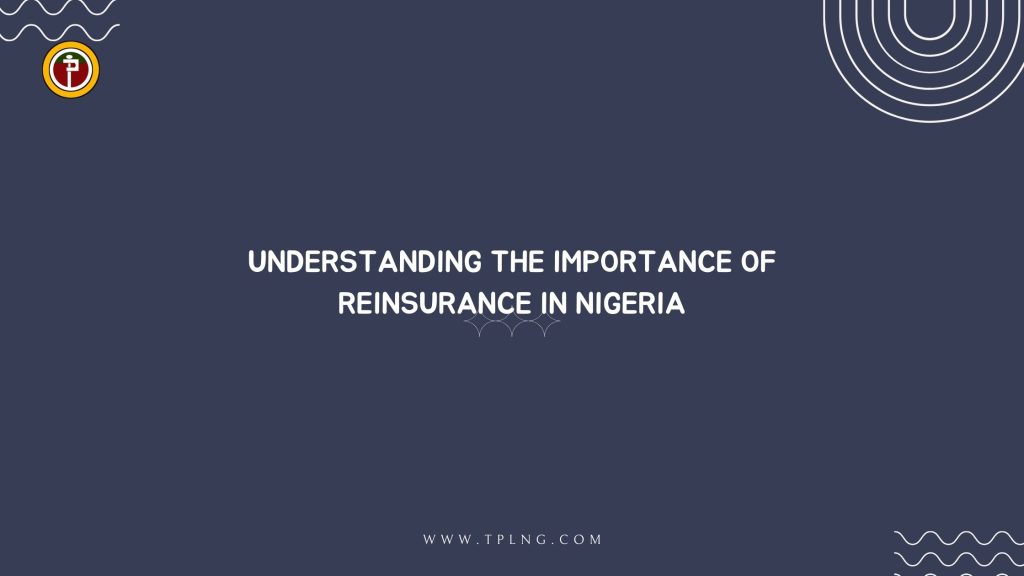In the landscape of Nigeria’s burgeoning insurance industry, reinsurance stands as a cornerstone of stability and growth. As insurers strive to mitigate risks and safeguard the interests of policyholders, reinsurance emerges as a vital tool.
This article delves into the concept of reinsurance, its significance, and its impact on the Nigerian insurance sector.
What is Reinsurance?
Reinsurance is the process by which an insurance company (the cedant) transfers a portion of its risks to another insurance company (the reinsurer). This is done to reduce the potential financial impact of large or unexpected claims. Essentially, reinsurance is insurance for insurers.
Also read The Benefits of Group Personal Accident Insurance
Types of Reinsurance
Facultative Reinsurance: This type of reinsurance is negotiated separately for each policy that an insurer wants to reinsure. It is typically used for individual, high-value policies.
Treaty Reinsurance: In this arrangement, the reinsurer agrees to cover a portfolio of policies under a pre-determined contract. It offers more generalized coverage than facultative reinsurance and is often used for standard risk categories.
The Importance of Reinsurance
- Risk Management and Stability: Reinsurance allows insurers to manage their risk exposure by spreading it across multiple entities. This enhances the financial stability of the insurance company, ensuring it can meet its obligations even in the event of significant claims.
- Capital Relief: By transferring risk to reinsurers, insurance companies can free up capital. This capital can then be utilized for other purposes, such as expanding business operations or investing in innovative products and services.
- Regulatory Compliance: Reinsurance helps Nigerian insurers meet regulatory requirements, ensuring compliance with industry standards.
- Increased Capacity: Reinsurance enables insurers to underwrite policies beyond their usual capacity. This is particularly important in Nigeria, where large infrastructure projects and commercial enterprises require substantial coverage that a single insurer might not be able to provide on its own.
- Protection against Catastrophic Events: Nigeria, like many other countries, is susceptible to natural disasters and other catastrophic events. Reinsurance provides a safety net, ensuring that insurers can cover large-scale losses without facing financial ruin.
- Encouraging Investment: A robust reinsurance market boosts investor confidence. It signals that the insurance industry is well-prepared to handle risks, thereby attracting both local and international investments.
Also read Understanding the Concept of Subrogation in Insurance
The Reinsurance Market in Nigeria
Nigeria’s reinsurance market has evolved significantly over the years. Key players include Africa Reinsurance Corporation (Africa Re), Continental Reinsurance, and WAICA Re. These companies provide critical support to local insurers, enabling them to manage their risk portfolios effectively.
Benefits of Reinsurance in Nigeria
- Enhanced Public Trust: Reinsurance instills confidence in policyholders, knowing their risks are backed by additional security.
- Increased Insurance Penetration: Reinsurance promotes insurance growth by enabling insurers to offer more products and services.
- Economic Growth: Reinsurance contributes to economic development by protecting businesses and industries from unforeseen risks.
Also read Understanding the Difference between Insurance Brokers and Agents
Challenges and Opportunities of Reinsurance in Nigeria
While the reinsurance market in Nigeria has made substantial progress, it still faces challenges:
- Regulatory Environment: Regulatory changes affect the reinsurance market. Compliance with regulations is crucial for stability.
- Market Penetration: Insurance penetration in Nigeria is low. Increasing awareness and understanding of insurance and reinsurance is key for market growth.
- Technological Advancements: Technology can improve reinsurance processes. Innovations like Blockchain and AI can streamline claims, risk assessment, and fraud detection.
- Capacity Building: Developing local expertise in reinsurance is essential. Training and partnerships with international reinsurers can create a skilled workforce.
Also read A Beginner’s Guide to Buying Insurance in Nigeria
In conclusion, reinsurance is a critical component of Nigeria’s insurance industry, providing risk management, financial stability, and capacity building. Its importance cannot be overstated, as it protects policyholders, promotes industry growth, and contributes to economic development.
As the Nigerian insurance market continues to evolve, the role of reinsurance will remain vital in ensuring the industry’s long-term success and sustainability.
Take advantage of the next article, subscribe now!
Have questions about claim settlements or need assistance with your insurance policy? Our team is here to help! Reach out to us via email at info@tplng.com or give us a call at 0905-776-6182. We’re committed to ensuring genuine claim settlements and supporting our valued members.
TPL, your satisfaction is our priority.




